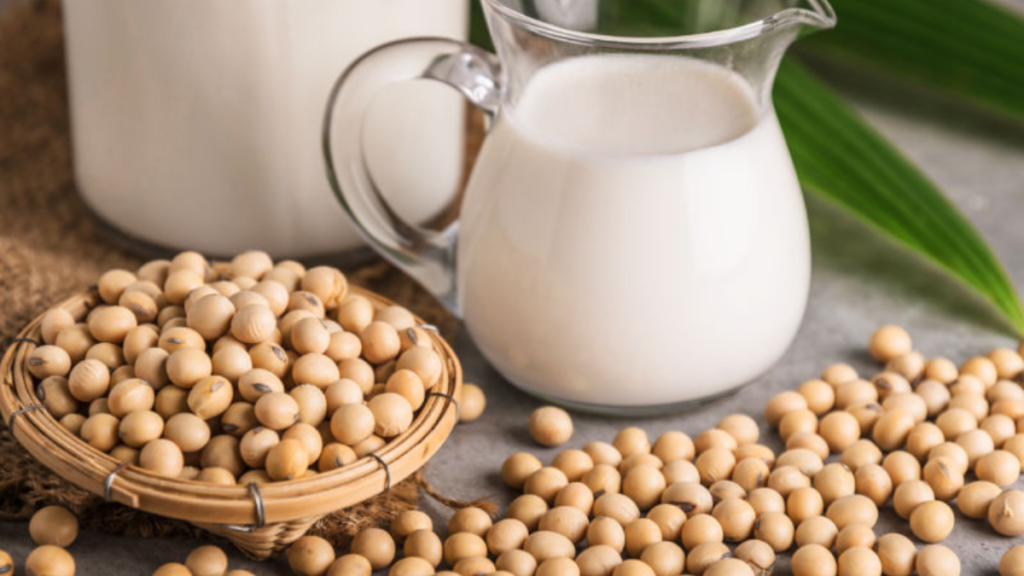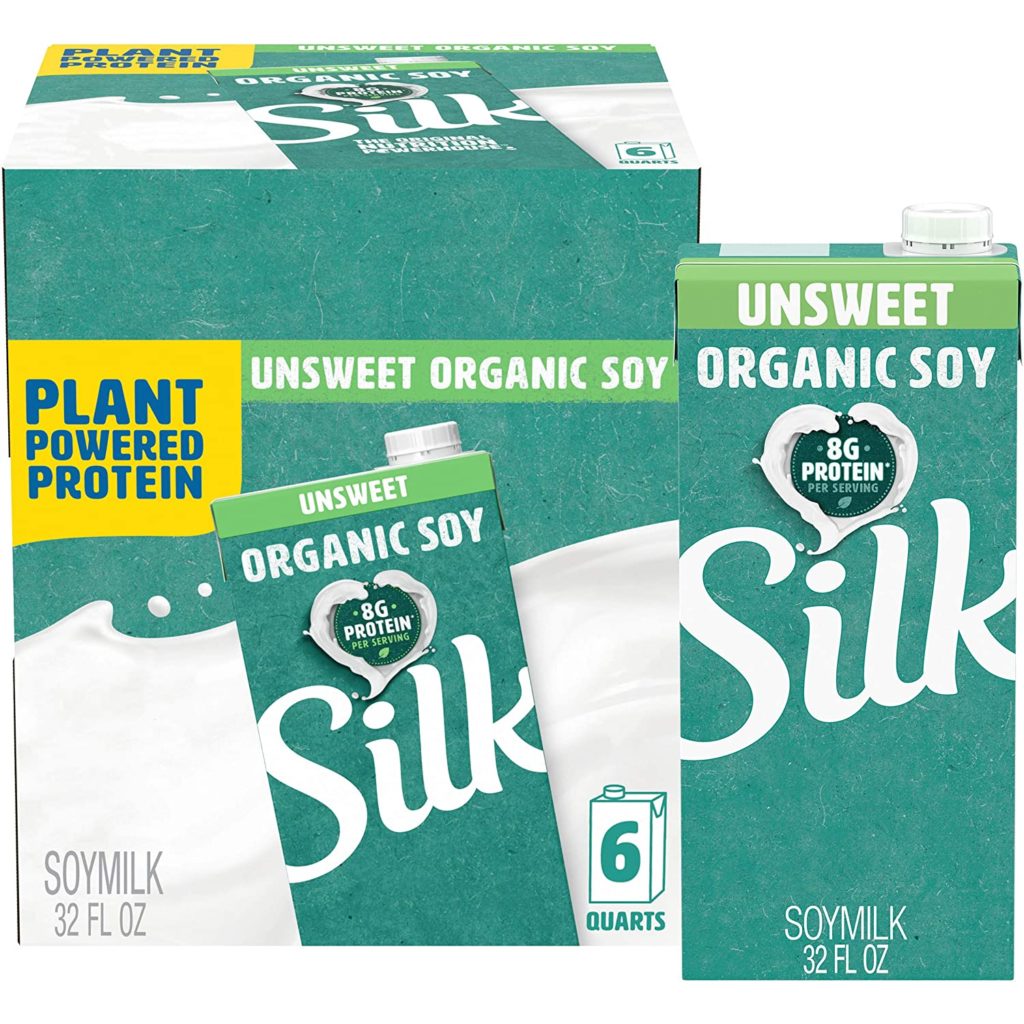Soy milk is a well-known dairy milk substitute, but it’s more than just a filler. On its own, soy milk can be a healthy complement to your diet. This nutritious and tasty beverage began as a tofu-making process byproduct. Soy milk is now available throughout the country as a lactose-free dairy alternative with unique health benefits. Soy milk’s vitamins, minerals, and antioxidants may have significant health benefits.
Vitamin B types in soy milk are crucial for maintaining nerve cells and DNA in your body. They can also aid in preventing anemia, which can result in tiredness and exhaustion. Protein is also abundant in soy milk. Soy milk protein is nutritious, plant-based, and can aid in the maintenance of healthy muscles and organs.
Soy Milk Nutrition Facts
Here is a table for Soy Milk Nutrition Facts:
| Nutrient | Amount per 1 cup (240 mL) |
| Calories | 80 |
| Total Fat | 4 g |
| Saturated Fat | 0.5 g |
| Trans Fat | 0 g |
| Cholesterol | 0 mg |
| Sodium | 75 mg |
| Total Carbohydrate | 4 g |
| Dietary Fiber | 1 g |
| Total Sugars | 1 g |
| Added Sugars | 1 g |
| Protein | 7 g |
| Vitamin D | 1.2 mcg (6% DV) |
| Calcium | 300 mg (23% DV) |
| Iron | 1.8 mg (10% DV) |
| Potassium | 300 mg (6% DV) |
| Vitamin A | 49 IU (1% DV) |
| Vitamin B12 | 3.3 mcg (140% DV) |
| Magnesium | 24 mg (6% DV) |
Remember that the aforementioned values are for unsweetened soy milk. It is always crucial to verify the label for precise nutrition information, as flavored or sweetened variations may include varying levels of nutrients.
Soy Milk’s Health Advantages
Soy milk, created by soaking, crushing, and boiling soybeans with water, is a nutrient-dense beverage. Essential fatty acids, proteins, fiber, vitamins, and minerals are abundant in soy, and these nutrients provide you with energy and help your body perform at its best. The six essential health benefits of consuming soy milk are listed below.
Brain Health
Omega-3 fatty acids, found in soy milk, are “good” fats that your body cannot produce. Omega-3 fatty acids have been related to a lower risk of Alzheimer’s disease and dementia, and Soy milk’s influence on various disorders is still being researched. However, soy is one of the most excellent non-animal sources of omega-3 fatty acids.
Improved Heart Health
Soy milk can also improve your heart and circulatory system. Whether fortified or not, Soy milk is a good source of potassium, and potassium is essential for maintaining healthy blood pressure and pulse. Soy milk has also been related to reducing cholesterol levels, particularly those with high cholesterol.
Reduced Symptoms of Menopause
Isoflavones, a molecule known as “phytoestrogens,” are found in soy milk. In the body, these isoflavones work like a weak kind of estrogen. As a result, studies have indicated that soy milk and other soy products may help to alleviate menopause symptoms like hot flashes.
Improve Lipid Profile
The capacity of soy milk to improve your blood lipid profile is its most crucial feature. Soy milk fat is unsaturated mainly and cholesterol-free, unlike dairy milk, which is heavy in saturated fat and cholesterol. Soy’s monounsaturated and polyunsaturated fatty acids can prevent cholesterol from entering your bloodstream. Regular consumption of soy has been proven to lower triglyceride and low-density lipoprotein (LDL) levels in the blood while increasing the level of high-density lipoproteins (HDL) (HDL). If you have excessive cholesterol or have a family history of coronary heart disease, soy milk is an excellent choice.
Strengthen Blood Vessel Integrity
Soy’s omega-3 and omega-6 fatty acids and potent Phyto-antioxidants help protect your blood vessels from lesions and hemorrhage. These substances bind to the lining of your blood vessels and protect them against free radicals and cholesterol buildup. These nutrients’ binding improves the fluidity and flexibility of your blood vessels, making them more resistant to blood pressure fluctuations.
Promote Weight Loss
Soy milk has a lower sugar level than conventional milk by nature. Cow’s milk comprises roughly 12 grams of sugar per cup, but soy milk has only 7 grams. A cup of whole soy milk, which is equal to skim milk, has only 80 calories. Furthermore, the monounsaturated fatty acid in soy milk might limit fat absorption in the intestine, another significant benefit for weight loss. Soy milk also provides an extra dose of fiber, allowing you to feel satisfied for longer.
Prevent Prostate Cancer
Phytoestrogen, a unique plant hormone that can decrease testosterone production in males, is abundant in soy milk. Reduced testosterone levels can reduce the risk of prostate cancer considerably. According to studies, men who eat a soy-rich diet are less likely to develop prostatic enlargement or prostate cancer.
Prevent Postmenopausal Syndromes
The natural estrogen synthesis in a woman’s body decreases throughout menopause. For postmenopausal women, the abrupt decrease in estrogen causes a slew of health issues. Heart disease, diabetes, and obesity are more common in postmenopausal women, and they’re also prone to melancholy, mood swings, sleeplessness, and other mental illnesses. Soy phytoestrogen is an efficient estrogen substitute, and Soy consumption is an excellent approach to avoiding and treating certain postmenopausal disorders.
Prevent Osteoporosis
Another age and the hormone-related condition is osteoporosis. Soy contains phytoestrogen, which can help your body absorb calcium faster and prevent bone loss. Make sure to get soy milk that has been fortified with additional calcium and vitamin D for the best results.
How Can you Include Soy Milk in your Diet?
Soy milk is widely available in grocery stores, health food stores, and restaurants across the United States. Soy milk can also be made at home. Soak ten ounces of soybeans overnight in water. Then, for 10 minutes, boil these beans in twelve cups of water. Blend the water and soybeans until smooth, then cook for 40 minutes. You can season with a pinch of salt or sugar to taste. After the soybeans have finished cooking, strain the mixture through a cheesecloth to remove the solids.
Soymilk can be kept in the refrigerator for up to a week, roughly the same amount of time as dairy milk. Here are a few ways to incorporate soy milk into your diet: Make a smoothie with soy milk. Make your coffee with soy milk. Consume soy milk with your cereal. Soy milk can be used in baked products. With soy milk, make a bechamel sauce. Curry can be made with soy milk.
Is it Good to Drink Soy Milk Every Day?
Protein can be obtained by drinking soy milk daily. According to the American Institute for Cancer Research, one to two 8-ounce cups of soy milk per day are deemed safe and provide many nutrients as cow’s milk. Soy milk is prepared by soaking soybeans in water, grinding them up, then straining them. This milk’s fiber and soy protein may reduce your high cholesterol and heart disease risk. While soy milk isn’t very calorie-dense, eating too many calories from any source might lead to weight gain.
Some people may be allergic to soybeans and should avoid soy milk, just as they avoid almond milk. Antinutrients are chemicals found in soy milk that some people call antinutrients. These natural antinutrients can disrupt protein and carbohydrate digestion and limit the body’s ability to absorb critical nutrients.
Which is Better, Almond Milk or Soy Milk?
Almond milk has the fewest calories (30 to 50) and minor protein (1 gram per cup). Isoflavones, a type of phytonutrient found in soy milk, have been shown to have cancer-fighting qualities. Soy milk is high in polyunsaturated fat, which is good for your heart. If you consume fewer than three servings of soy milk per day and do not have a soy allergy, it is not harmful to your health. Soy milk and other soy products have long been thought to be harmful to one’s health.
This is partly due to animal studies that have painted soy negatively. For most people, cow’s milk is the ideal option because it provides a good source of protein and calcium. Switch to reduced fat or skim milk if you’re attempting to lose weight. Lactose-intolerant people should choose lactose-free milk.
When is it Advisable to Consume Soy Milk?
Drink a glass of soy milk each night before bed to fall asleep considerably faster and get a night of uninterrupted 8-hour sleep. Above all, even children can safely consume soy milk. One to two servings of entire soy meals each day, including soy milk. For example, if you’re having tofu stir-fry for the evening, you can still add 1 cup of soy milk to your morning smoothie.
According to the AICR, up to three servings per day have proven safe in studies. As a result, some women believe consuming soy will help them grow larger breasts, and this is a lie, just as it is with dairy milk. There are no clinical trials or proof that phytoestrogens cause larger breasts.
Is Soy Milk Good for Women’s Health?
High-protein, calcium-fortified soy milk benefits women. Soy milk’s health benefits for women have fluctuated, but new research reveals that most women can safely drink it.
Soy is beneficial during menopause, according to studies. In 35 trials, postmenopausal women taking soy isoflavone supplementation had 12% higher estradiol levels. Soy isoflavones exert estrogenic or anti-estrogenic effects by binding to oestrogen receptors. Soy isoflavones include genistein and daidzein.
Conclusion
The majority of the soy milk sold in supermarkets and health food stores has been supplemented with vitamins and minerals. As a result, fortified soy milk provides an excellent source of calcium, the most abundant mineral in the human body. Calcium can help strengthen your bones and lower your risk of osteoporosis if you consume enough of it.




